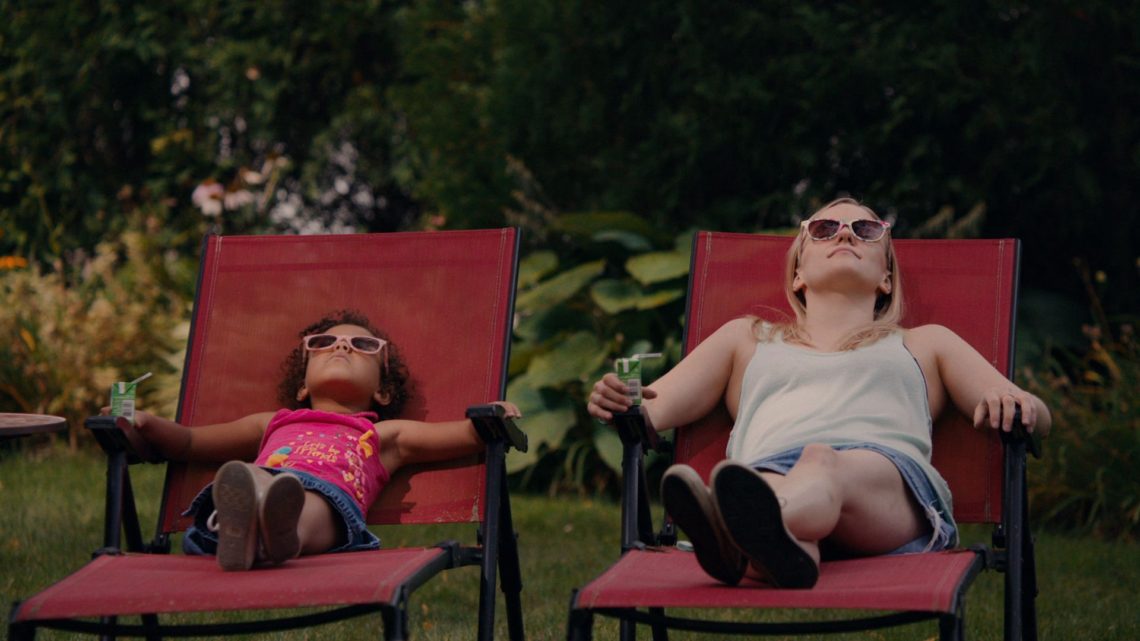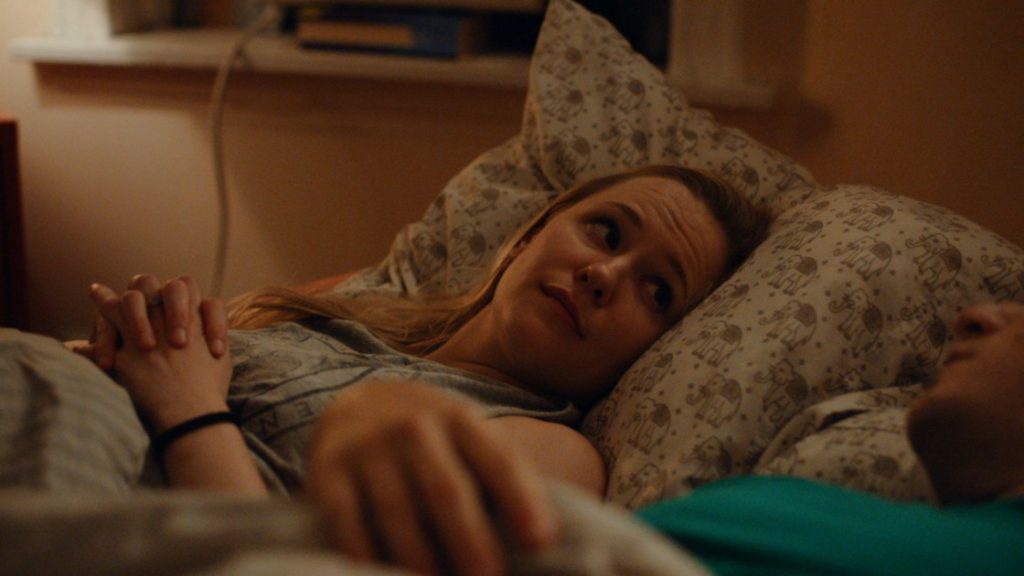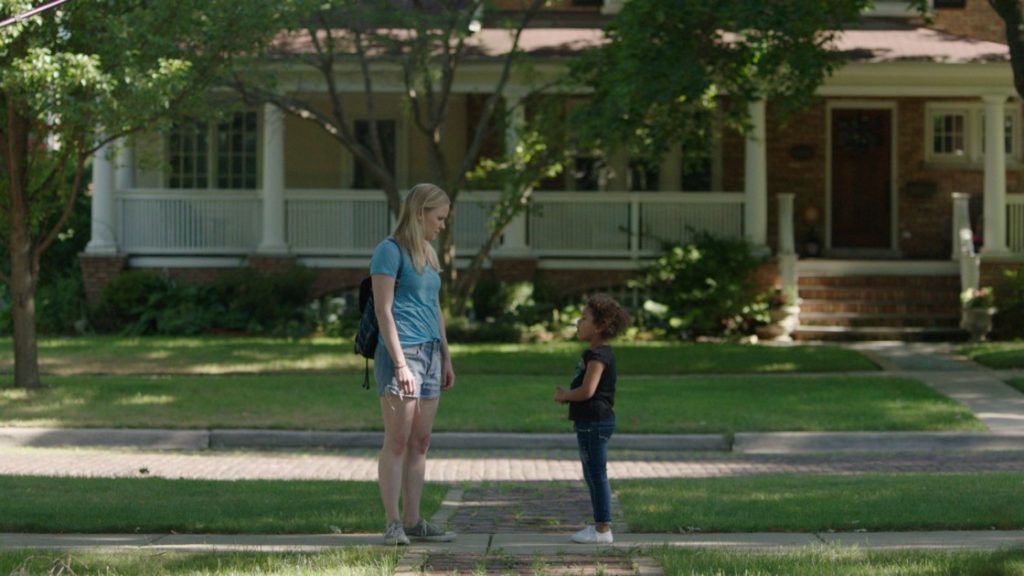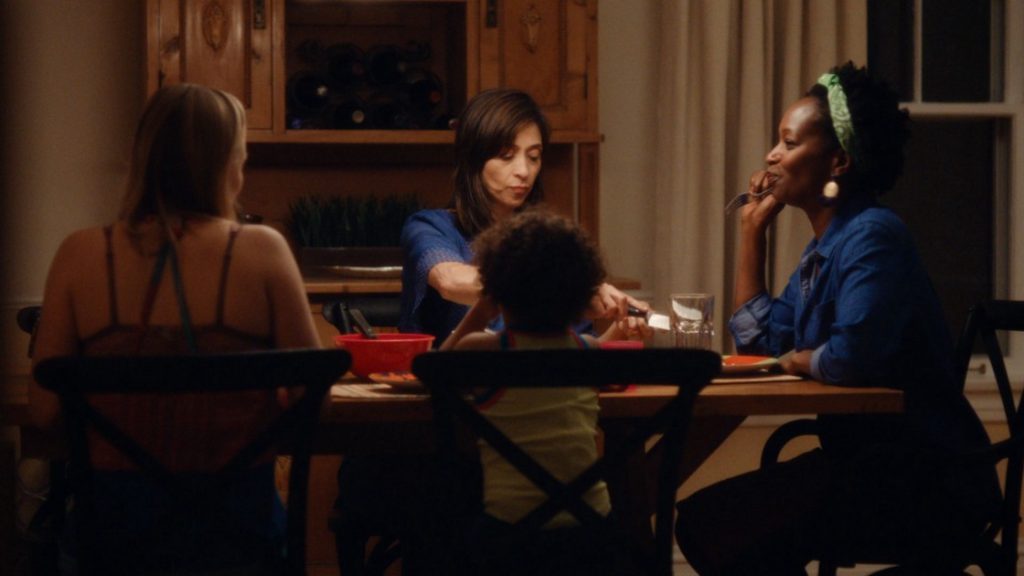
Saint Frances Interview: Kelly O’Sullivan and Alex Thompson
“We don’t have to do anything but present it and a lot of people will feel seen by it and a lot of people might feel like it’s too much. But it will beg the question ‘Why do I feel like it’s too much?’ ”
SAINT FRANCES delicate yet joyful. It approaches complex issues of trauma, motherhood, and relationships through a lens of empathy, letting the audience do the work of navigating their own feelings on the subject.
The film, beautifully directed by Alex Thompson, documents the life of Bridget, a thirty-four-year-old woman struggling with her existence when she unexpectedly gets pregnant.
Writer and actor Kelly O’Sullivan expertly portrays the emotional and physical impact of Bridget’s medication abortion without lecturing the audience. While this is a small bit of the film, the impact of this choice both on her body and in her emotions lingers throughout.
SAINT FRANCES won the Audience Award and a Special Jury Award at SXSW in 2019 and is now available on iTunes and VOD in Canada.
Tell us a little bit about yourself, and how you got involved with filmmaking.
Alex Thompson: I grew up in Kentucky and had a grandfather, a Greek immigrant, who really loved movies. I have really early memories of watching old movies with him and it just led all the way through college and trying to find a place in LA and New York, and finally made my way to Chicago. It was there that I met Kelly. After four or five years of producing and directing a few shorts and music videos, Kelly’s script came along, and it was just so good that it was just like ‘drop everything, let’s do this.’
Kelly O’Sullivan: I was born and raised in Arkansas and went to North Western for theatre and was a theatre actor for the majority of my career. Saint Frances is my first screenplay and wrote it on a wing and a prayer hoping that we might be able to scrounge up the funds to make it. We were totally spoiled by how fast we were able to make it. It just ruined me for how long it takes to make movies.
How long was the process?
KOS: The filming process was twenty-two days, but in terms of the writing and pre-production, I started writing in January of 2018 and we were filming in July. Now I know just how rare that is to have that little time between the idea forming and being able to get it in front of cameras.
Tell us about Saint Frances and why you decided to tell this story.
KOS: I was actually a nanny in my twenties, so I knew what that experience was and how rich and complicated that relationship is and then I did actually have an abortion in my early 30s and I knew again what that experience felt like.
I hadn’t really seen my experience reflected on screen. I’ve seen other movies that involve abortions but they were always really dramatic portrayals. I wanted to write a story that wasn’t just this woman’s experience of having an abortion but then also having a job where she is taking care of children all day.

I want to talk about the abortion, I’ve never seen it done this way in a movie — at home and with pills. It kind of reminded me of Never Rarely Sometimes Always in the granular way it looks at the steps Bridget takes. Obviously, you understand what it feels like but can you speak about how you ensured all the details were correct.
KOS: It was really important because before I actually had my abortion I didn’t know medication abortions were possible. I feel like there’s so little education surrounding abortion and that you can, if you catch it early enough, have a medication one.
It was a major intention of the film to get really granular and get really specific and graphic in the way the actual abortion is photographed and talked about. We knew that we wanted to show her putting the pills in her cheeks and have them dissolve and then twenty minutes later she goes to the bathroom. Alex very smartly was like ‘let’s have him [the boyfriend] read the physical symptoms, let’s have this—we call it The Abortion Montage—where he talks about what you can expect.’
Then we wanted to show how long Bridget bleeds afterwards because that’s the experience I had. All of that was in an attempt to demystify an experience that is sort of shrouded in shame and pressure to keep it in the dark. We wanted to put it on screen and say there’s nothing to be scared of and just show it for what it is.
You guys were not shy about depicting blood and period blood on screen in the many ways it manifests itself.
KOS: There are so many things women are made to feel ashamed of surrounding our bodies and one of the first things is our periods. From the time that we’re very young, we’re taught that you should hide that you’re going through this thing and god how shameful if you bleed through your pants and somebody sees that.
I feel like so many women have an “embarrassing period story” so knowing that we would be dealing a lot with shame women feel, we wanted to: one, portray it realistically and two, have the audience interrogate. We knew that people would have feelings when seeing blood on screen and hopefully what it does is makes the audience interrogate their own feelings about it. We don’t have to do anything but present it and a lot of people will feel seen by it and a lot of people might feel like it’s too much. But it will beg the question ‘Why do I feel like it’s too much?’ We wanted it to feel real and let the audience do the work from there.
The theme of shame and getting help was approached in a very beautiful way. Especially when Annie says ‘why does no one know how to go to the doctor?’ I felt like it really opened up a dialogue about mental health and shame and would love to hear you speak about how you depicted this and where it all came from.
KOS: I did actually have prolonged bleeding and it took me a while to go to the doctor because I think I was living in a place of not wanting to — I just wanted it to be over. I didn’t want to deal with it anymore, I was so annoyed by the fact that I continued to bleed and I was sort of keeping it private. I was like ‘okay if I went through that Bridget should go through that too.’
Then I had an acquaintance who went through postpartum and waited a while before reaching out to get help. I think we know in an intellectual way that help is out there, but it’s a really different thing to ask for it. It’s a really different thing to make that call and say I should really go see someone about this thing. The first step is admitting to ourselves that we feel alone and we would not like to be alone in this.
I wanted them to have a conversation about this. All three of these women, Annie, Maya and Bridget, have things that they’re dealing with in a lonely, isolated, private way and once they start talking about it to each other that’s when they’re sort of released from their own shame.
I love how this dialogue led to Bridget’s monologue in the car. Can you talk a bit about the conception of this scene?
AT: Kelly had written a very beautifully written monologue for that scene and something that we talked a lot about when we were working together and developing the script was how good she should be about articulating these things. I was like ‘Oh we don’t need a monologue there, if people don’t get it by that point then we haven’t done our jobs.’
KOS: So it was cut from the script.
AT: When it came time to shoot the scene it wasn’t rehearsed, it wasn’t planned, and there was a realization on my part that we needed a monologue there. We needed to hear how Bridget was feeling. It was important to do it from the heart and improvise. What you see on screen is the first take.
KOS: It made me so mad because I had written exactly what I wanted to say and it’s been months since I thought about this and what came out was absolutely my true feelings and I’m really grateful that it came out in that way because it was really messy. I stumble over my words several times, I express myself in ways that I would never write but it’s just true. That line about ‘I don’t think this is my kid’ is the actual way I felt about my abortion, it was from the heart.
I did notice you stumble over your words and I love when films allow for that, it adds authenticity to it.
AT: It’s one of those things where we were losing light, there was no time. I feel like sometimes the more pressure, the better the thing ends up being. It’s an odd situation, you can prep all day but whatever happens, has to be magical.
The chemistry between Bridget and Franny is so lovely, can you speak about how you created that with Ramona?
KOS: We got really lucky in that Ramona is just so fun as a person. She’s so full of personality, and so delightfully weird in the best ways that little kids are that she and I got along so well right from the beginning. We would hang out together all day, even when we weren’t shooting. It kinda just felt like I was her nanny. We loved each other, a lot.
The funny thing is that a lot of people think that she must have improvised her lines, and the real magic is that all of her lines are scripted. We did the least improvisation of anybody with her. I think that just speaks to her talent. That she’s just able to deliver scripted lines like she’s just thinking of them in the moment.

I’d love to talk about religion in the film. It’s not judgemental or angry which I think you get a lot with films where the main character is agnostic.
AT: I think it’s interesting because, with Kelly and I, our instincts are to be like screw all that, religion sucks. But I think that we approached all the characters with a great deal of empathy, and that meant embracing Maya’s catholicism. Charin Alvarez is also Catholic so the conversations we had in rehearsals and readthroughs were so enlightening and dynamic.
We didn’t want to give anybody an excuse to turn this movie off. We didn’t want to give people an excuse to say ‘this is just one subjective view, look at how they’ve demonized this population, or look at how this person is villainized.’ Even down to the boyfriend, the most heteronormative character in the film, he’s not a saviour but he’s also not a total buffoon.
KOS: It’s sort of like the blood. The audience is going to do so much of their own work surrounding religion, it’s enough to just have it be there. Everybody knows Catholicisms stance on abortion, we don’t need to go into that. We don’t need to teach anybody a lesson. I always talk about catholicism as a ghost in the background because that’s how Bridget was raised, and how I was raised. I feel like it’s ever-present to me even though I am a fallen Catholic. We didn’t need to do any work surrounding it, we just needed to present it as part of the landscape of the environment and people will take from it what they will.
It was so nice to see a lesbian couple on-screen that are just living their lives and who don’t die at the end. Can you speak about why you wanted the main couple to be a progressive, feminist, lesbian couple?
KOS: So much of the film is about normalizing things that maybe other TV and film have othered. Treating abortion as normal, treating postpartum as an experience people have and parenting as normal.
I always saw that couple as a lesbian couple and then I knew that I didn’t want to make the drama in their relationship rooted in their sexuality. The drama and the struggle comes from the universal struggle of parenting. It’s really difficult to be a parent and to be in partnership with another parent, especially when dealing with the birth of a second child and postpartum. I always knew that I wanted the tumult that they’re going through in their relationship to be that struggle rather than them struggling with the world not accepting them or internally struggling with their own sexuality. That maybe happened at a different point in their lives but at this moment their struggle is rooted in parenting.

I love how the film explores different sides of motherhood, including seeing Bridget’s mother and how motherhood exists when your child becomes an adult. Why did you decide to include this scene in the film?
KOS: There is something so valuable to me about the intergenerational conversation between women about motherhood and about parenting. I took that scene directly from conversations I’ve had with my own mom that really informed how I think about motherhood. That story about her wanting to slam the baby’s head against the wall, she told me that while laughing and I just think that’s so illuminating in terms of the struggles of motherhood. I knew that I wanted to have Bridget hear this from her mom and later on when she’s talking to Maya and Maya echos a similar thing—and she’s in the throws of it, she can’t yet laugh at it — that Bridget can say ‘my mom said the same thing, you’re not alone in that.’ It’s really valuable that we are able to say my mom went through the same thing.
The conversation was also important to me because I sort of knew that there might be people in the audience that are looking for reasons why Bridget decided to have an abortion. One might be that she has this bad boyfriend so I deliberately wrote the boyfriend as being very lovely and sensitive so people couldn’t use that as a scapegoat. I also knew people might go ‘yeah if she were raised better or if she had better parents,’ so I wanted them to meet Bridgets parents to see that they’re actually lovely. I also think that scene does a good job of putting pressure on Bridget from her mom which is something I think a lot of women experience from their mothers.
I noticed Hal Ashby’s name in the credits, can you speak about his connection to the film.
AT: Oh yeah, when we were in development, viewed a documentary called Hal that is a really wonderful documentary by Amy Scott. I’d never seen the film Coming Home but I’d been a big fan of Hal Ashby’s work for one reason or another but I hadn’t really made the connection to my own work.
What I found when I was revisiting his work, and the work of some of his contemporaries in that time period, was a sort of objective eye that didn’t seek to impose a narrative on the narrative and it felt like a key to me with this film. In the same way that Coming Home feels like it could be this kind of saccharine Vietnam War, fist-shaking melodrama, it’s a sort of joyful fly on the wall almost documentarian look at this relationship that is cumulative in that film. I thought ‘oh this feels familiar, this feels like something that’s in this script.
Looking at his work, looking at the ways that he made films, that openness and empathy or lack of judgement, it was a huge inspiration for us.
*This post was originally featured on The MUFF Society.*

